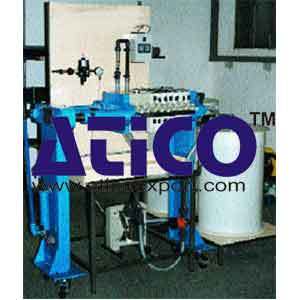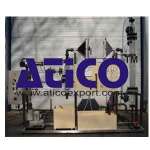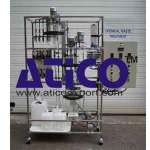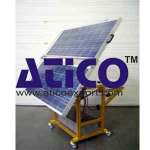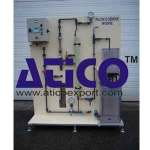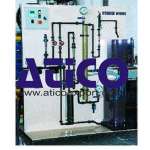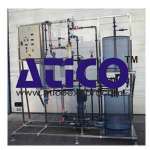Filter Press – Filtration On Support
Filter Press – Filtration On Support: This process consists of a filtration process wich is achieved by passing a fluid containing solid particles through a support (canvas, felt, membrane.) on which the particles deposit themselves under the shape of an increasing thickness cake. Larger particles are retained on the filter medium and begin to form a thickness of cake through which other smaller particles are filtered. The resulting filtrate being more or less pure. The operation is batch.
Teaching objectives
- Study of the support and filter resistance.
- Verification of Darcy’s law.
- Determinination of the curve P=f(Q) and identification of the various flow rates. (For a ‘concentration’ of pollution to treat and a given pressure, we can trace t/v = f(v).
- Determination of sealing point.
- Estimation of cake porosity.
Technical specifications
- Filter-press : frame in cast iron
8 polypropylene plates for 15 mm cakes. - Pneumatic pump with polypropylene membrane.
- 2 transparent tanks with drain and tap ; 1 with level measurement.
- 1 variable speed stirrer.
- 2 manometers.
- Regulator with filter for compressed air.
- 3 Flowmeters (feeding, permeate, measurement of pressure drop with water).
- The unit is mounted on a stainless steel frame with aluminium nuts. The feed system of the pump is in flexible PVC piping.
- The proposed filter-press enables the study of performance variations for imposed hydraulic conditions (constant or variable flow, variable or constant pressure).
- A range of 0 to 5 bars is sufficient to carry out a study. The pneumatic membrane measuring pump offers a wide flow and pressure range.
- The pump is adapted to viscous, loaded or abrasive solutions.
Dimensions
- 1200 x 830 x 1700 mm + 830 x 1200 x 1100 mm
Essential requirements
- Power supply : 220 V / single-phase / 50 Hz
- Kieselghur or clay solution 30 g/l and 50 g/l.
- Compressed air supply : minimum 2 bars / maximum 5 bars

